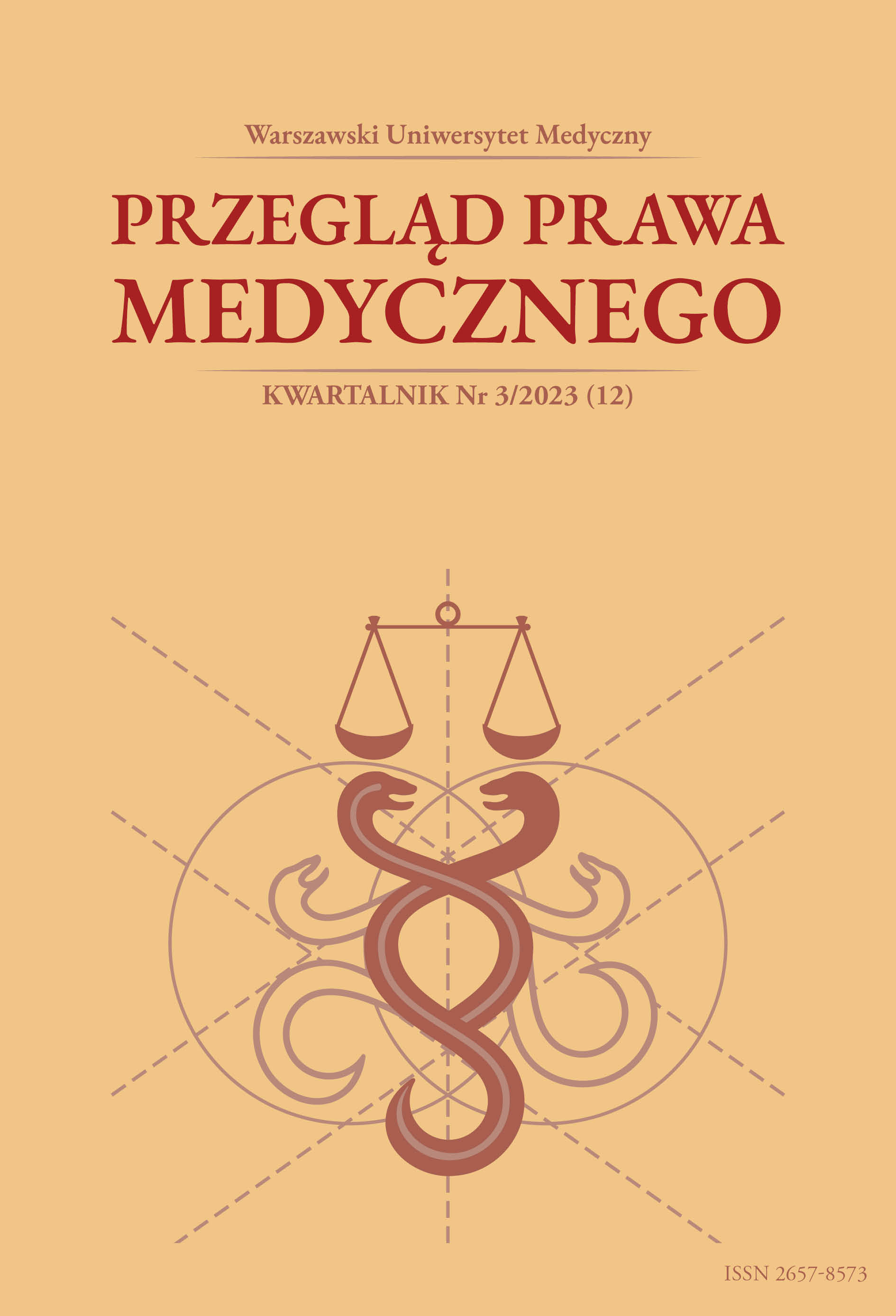Abstract
The outbreak of the SARS-CoV-2 coronavirus pandemic has brought health care issues to the forefront. The necessity to perform tests for the presence of this pathogen and to evaluate their results brought to wider public awareness what exactly laboratory diagnosticians do. On July 12th, 2022, a draft of a completely new legal act was submitted to the Parliament, which would regulate how to obtain the professional title of laboratory diagnostician, as well as the rules for practicing this profession. The legislative process ended on October 10th, when the bill was sent to the President for signature. The new legal act, in its essential part, came into force on December 10th, 2022. The new law provides for a number of significant changes aimed at bringing the rules governing the performance of laboratory diagnostics activities in line with the standards that exist for other professions involved in the provision of health care services. In view of its progressive nature, the draft justifiably raised high hopes for a reasonable and thoughtful regulation of the legal situation of laboratory diagnosticians. However, the changes introduced during the legislative process significantly reduced the effectiveness of the solutions proposed by the authors of the draft. As a result, already shortly after the law was passed, there were voices that despite the creation of a completely new legal act that, in principle, normalizes the legal situation of laboratory diagnosticians, the key demands that had been formulated for many years - particularly with regard to the recognition that the profession of laboratory diagnostician consists of performing health care tasks - had not been realized. It therefore becomes crucial to decide whether the Laboratory Medicine Act can positively affect the profession of laboratory diagnostician. This article aims to answer the question so posed, in particular, taking into account the differences, between the draft law and its enacted content, as well as in comparison with other legislation, which normalizes the way in which health care professions are carried out.
References
Budziszewska-Makulska A., Augustynowicz A., Waszkiewicz M., Tymiński R., Ustawa o diagnostyce laboratoryjnej. Komentarz, Warszawa 2010,
Druk nr 2683 z dnia 7 października 2022 r.,
Dyrektywa Parlamentu Europejskiego i Rady (UE) 2018/958 z dnia 28 czerwca 2018 r. w sprawie analizy proporcjonalności przed przyjęciem nowych regulacji dotyczących zawodów (Dz. U. UE. L. z 2018 r. Nr 173, str. 25),
Gackowska M., Interpretacja wyników badań laboratoryjnych w praktyce dietetyka. Część I – morfologia krwi obwodowej, „Food Forum” 1(11)/2016, s. 44-48,
https://legislacja.rcl.gov.pl/projekt/12336308/katalog/12702513, udostępniono: 2 października 2022 r.,
Konstytucja Rzeczypospolitej Polskiej z dnia 2 kwietnia 1997 r. (Dz. U. Nr 78, poz. 483 z późn. zm.),
Petycja w sprawie uchylenia zapisów Ustawy z dnia 27 lipca 2001 r. o diagnostyce laboratoryjnej (Dz.U. 2001 nr 100 poz. 1083 z późn. zm.), dopuszczających do zawodu diagnosty laboratoryjnego osoby bez potwierdzonych kwalifikacji (nr BKSP-144-IX-555/21),
Rozporządzenie Ministra Zdrowia z dnia 7 grudnia 2004 r. w sprawie kształcenia podyplomowego w zakresie analityki medycznej (Dz. U. Nr 269, poz. 2680),
Rządowy projekt ustawy o medycynie laboratoryjnej z dnia 12 lipca 2022 r., druk nr 2247,
Sprawozdanie Sejmowej Komisji Zdrowia z dnia 7 października 2022 r., druk nr 2687,
Świtała K., Katalog tajemnic związanych z wykonywaniem zawodów medycznych, „Monitor Prawniczy”, nr 13 (2014), s. 716-717,
Tuleja P. [w:] P. Czarny, M. Florczak-Wątor, B. Naleziński, P. Radziewicz, P. Tuleja, Konstytucja Rzeczypospolitej Polskiej. Komentarz, wyd. II, LEX/el. 2021, art. 17, teza 1,
Ustawa z dnia 15 lipca 2011 r. o zawodach pielęgniarki i położnej (t.j. Dz. U. z 2022 r. poz. 551 z późn. zm.),
Ustawa z dnia 15 września 2022 r. o medycynie laboratoryjnej (Dz. U. poz. 2280),
Ustawa z dnia 23 czerwca 2006 r. o zmianie ustawy o diagnostyce laboratoryjnej oraz ustawy o zawodach lekarza i lekarza dentysty (Dz. U. Nr 117, poz. 790),
Ustawa z dnia 27 lipca 2001 r. o diagnostyce laboratoryjnej (t.j. Dz. U. z 2022 r. poz. 134 z późn. zm.),
Ustawa z dnia 28 sierpnia 2003 r. o zmianie ustawy o diagnostyce laboratoryjnej oraz o zmianie innych ustaw (Dz. U. Nr 171, poz. 1663 z późn. zm.),
Ustawa z dnia 5 grudnia 1996 r. o zawodach lekarza i lekarza dentysty (t.j. Dz. U. z 2022 r. poz. 1731 z późn. zm.),
Wyrok Sądu Najwyższego z dnia 13 lipca 2012 r., III ZS 4/12, OSNP 2013, nr 15-16, poz. 195.

This work is licensed under a Creative Commons Attribution 4.0 International License.
Copyright (c) 2023 Maciej Babula

